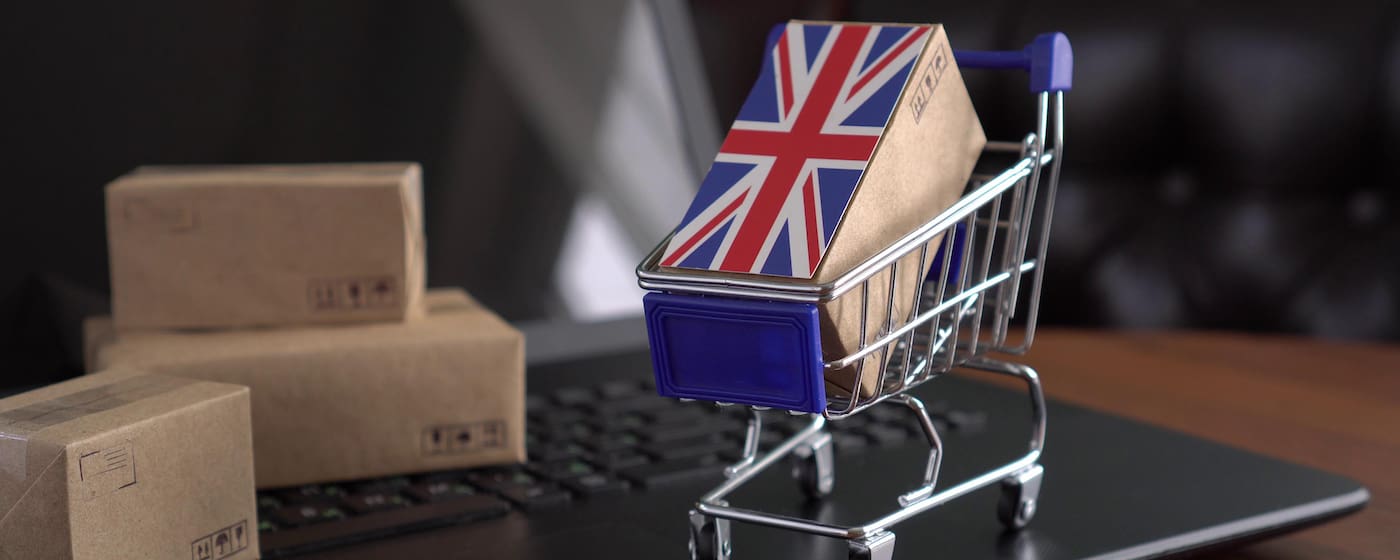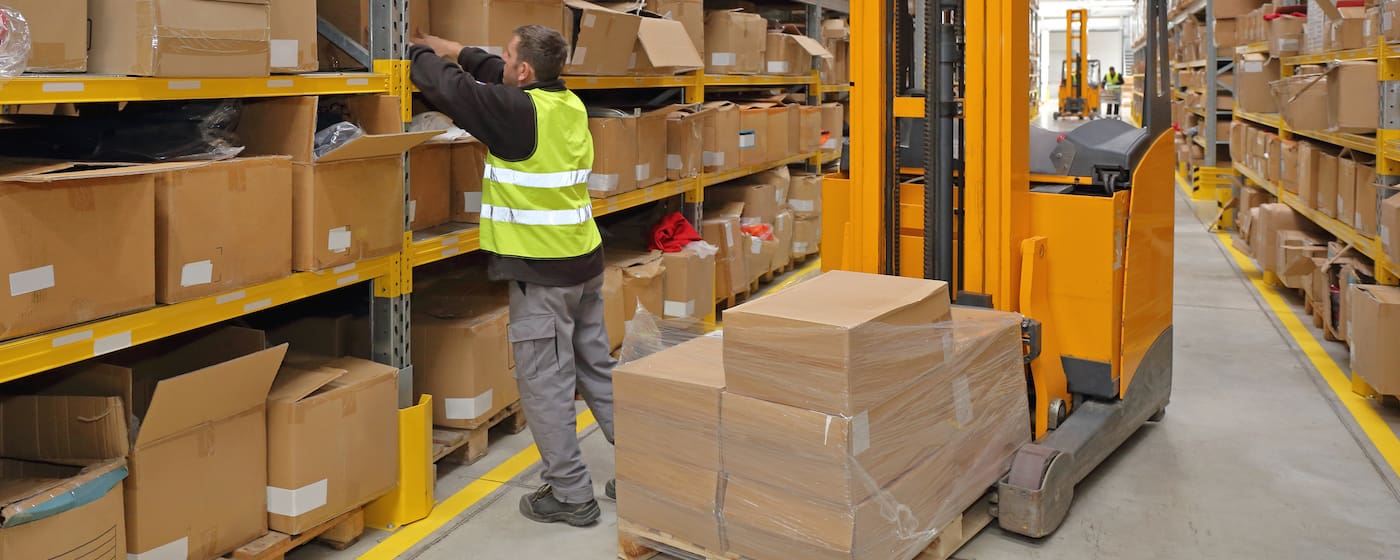Table of Contents
** Minutes
First things first: Legal requirements for selling online in the UK
Post-Brexit considerations for UK online sellers
Top 5 marketplaces and platforms in the UK
How to start selling online in the UK in 6 easy steps
The United Kingdom is the world’s fourth-largest market for ecommerce.
This signals great potential for businesses looking to sell online in the UK, thanks to its tech-savvy population that is comfortable with online retail and digital payments.
Fashion, food and personal care, and electronics and media are some of the most popular online retail segments in the nation.
But, Brexit led to the introduction of some new Value-Added Tax (VAT) and customs rules that you need to be mindful of before selling online.
If you’ve started an ecommerce business in the UK and need to learn how more about selling online, this article will provide information on everything from setting up your e-retail business to how Brexit has affected online selling.
We also explore how ShipBob can serve and help UK-based ecommerce sellers from the get-go.
First things first: Legal requirements for selling online in the UK
Before you start selling online in the UK, you need to have some permits in place and lay the legal groundwork.
Here are the first things merchants or entrepreneurs will need to tackle when starting an ecommerce venture in the UK.
Registering for VAT
Whether you operate in the UK or are looking to expand to the country, you need to be aware of VAT, which is an ecommerce tax based on consumption.
For goods imported into the UK, you need to pay import VAT, which includes a standard rate (20%) applicable on most products, a reduced rate (5%) applicable on some health products and child car seats, and a zero rate (0%) applicable on food, books, and children’s clothing.
And you can register your business for VAT by filling in a form online. Once VAT-registered, your business can start charging and reclaiming VAT.
Understand currency exchange rates
If your business sells to shoppers in another country, they may end up with higher upfront payments owing to poor exchange rates or bank charges for foreign currency transactions.
Because exchange rates fluctuate all the time, it could favour the retailer at one time and the buyer at another time. The results in an inconsistent customer experience.
So it would help to price your goods differently, based on the shoppers’ preferred currency.
Choose your payment methods
Credit card, debit card, and direct debit are some of the popular payment methods in the UK. JP Morgan study estimates that digital wallets could account for around a third of the payments by 2023.
So, it is recommended that your online storefront offers multiple payment modes to enable shoppers to pay with ease.
Understand compliance and regulations
So that you stay on the right side of the UK laws, here are some of the regulations your business needs to comply with:
- The Electronic Commerce Regulations 2002: This involves putting your business name and address, company registration number, VAT number, T&Cs, marketing offers, direct contact information, prices, tax and delivery charges on your ecommerce website.
- Data Protection Act 1998: You must register with the ICO, collect only personal data that is critical to your business needs, ensure secure data storage, remove personal data if requested by individuals, mention in the T&Cs what you use the data for, and so on.
- Consumer Protection (Distance Selling) Regulations 2000: This involves offering customers clear information about product and service (prior to purchase), postage and packaging costs, VAT in the price, timeframe to cancel or return their order, etc.
- Privacy and Electronic Communications (EC Directive) Regulations 2003: This includes informing shoppers about website cookies, how you use cookies (via your privacy policy), and how to turn off cookies.
Post-Brexit considerations for UK online sellers
It’s commonly said that ecommerce players face a lot more bureaucracy and taxes post-Brexit.
Whether you are cross-border selling to or from the UK, you are likely to face higher shipping costs (due to VAT and the tariffs), delivery delays (due to red tape), and increased paperwork since Brexit.
- From Jan 2022, the Border Operating Model applies in the UK which demands complete customs declarations to control the movement of goods.
- Ever since the EU-UK Trade and Cooperation Agreement (TCA) on 24th December 2020, online selling has been affected with stricter customs regulations, more paperwork, and border checks.
- Post-Brexit, you need to keep handy your unique EORI (Economic Operators Registration and Identification) number to support customs clearance.
- Changes in VAT rules post Brexit also meant that any items shipped between the EU and the UK will be tagged as an import or export and subject to VAT.
Top 5 marketplaces and platforms in the UK
As per our experts, the top 5 online selling sites UK or best selling sites UK include:
1. Amazon
If you are looking for a portal that has incredible reach, Amazon is your best bet. It is the fourth most visited website and leading ecommerce platform in the UK.
- Because Amazon is so popular in the UK (and world), you gain access to a lot more buyers.
- Since Amazon is so trusted, if you have a store with them, by extension shoppers will trust your brand too.
- Amazon’s global reach and a wide variety of goods sold.
- Integrates seamlessly with ShipBob for quick and fuss-free order fulfilment.
Here are details of the plans they offer to retailers:
| Individual | Professional |
| £0.75 (exclusive of VAT) / item sold + additional selling fee | £25 (exclusive of VAT) / month + additional selling fee |
| You sell fewer than 35 items a month and don’t plan to advertise. | Sell more than 35 items a month and plan to advertise and use advanced selling tools. |
*Information in this table has been sourced from the Amazon website.
2. eBay
The UK features 25% of all eBay sellers. You can sell on the Ebay marketplace, goods from different product categories. But, it is mostly known for second-hand items or cheap household goods. Some of the benefits of selling on eBay include:
- Offers an auction listing format that helps you secure better rates for your product.
- Offers user-friendly store UI and UX.
- Offers seller protections.
- Enables open and transparent transactions.
- Integrates seamlessly with ShipBob for quick and fuss-free order fulfilment.
| No shop | Basic | Premium/Featured | Anchor |
| Pay as you sell | £27/month | £77/month | £437/month |
| Promote your listings Seller Hub | Promote your listings Seller Hub 250 free listings Seller Hub Promotions Shopfront Daily Deals eligibility Terapeak Sourcing Insights | 1,500 free listings Seller Hub Promotions Shopfront Daily Deals eligibility European Sales Booster Comparative pricing via API Terapeak Sourcing Insights eBay packaging voucher with £10 | Unlimited free listings Seller Hub Promotions Shopfront Daily Deals eligibility European Sales Booster Comparative pricing via API Terapeak Sourcing Insights eBay packaging voucher worth £20 Free listing in two categories |
* Rates listed in the table above are secured from the eBay website.
3. Etsy
In 2021, Etsy was the second most popular marketplace in the world. It’s a good place to sell niche or homemade goods from small businesses.
- Offers easy-to-use tools that enable you to manage and promote your store.
- Offers a transparent fees model.
- Easy to open a store on Etsy.
With the standard plan, sellers are charged a £0.16 listing fee, wherein the listings are active for four months. And you are also charged a 6.5% transaction fee, 4% + £0.20 payment processing fee when you sell an item. There is no monthly charge here.
But, with the Plus plan, you are charged £8.00 a month. And you receive more opportunities to customise your store, 15 listing credits and £4.00 in credit to advertise your items with Etsy Ads each month, the option of alerting customers when their favourite items are back in stock, and a 50% discount on custom .com address.
4. Wayfair
This is a great portal to be selling furniture and homeware on. Though it was founded in the US, it is much loved in the UK and enjoys over 24 million visits a month. You should consider partnering with Wayfair to sell your goods for the following reasons:
- Offers access to state-of-the-art data tools.
- Offers learning programmes for sellers.
- Is easy to setup an online store on Wayfair.
The company doesn’t charge you any fees nor take a portion of your online sales. Instead, they pay you a base cost for your goods, and then set a competitive retail price for the end customer.
5. ASOS
Here is a brand that was founded in the UK and is perfect if you retail original or vintage fashion items. Open a store on ASOS Marketplace for young adults in their twenties. When partnering with ASOS, new sellers need to set up a fully verified Business Paypal account.
Benefits of setting up an online boutique with ASOS include:
- No upfront seller fees to list your fashion items.
- Offers the chance to have your items featured in editorial coverage across the ASOS website, social media channels, newsletters and ASOS’ platforms.
- Offers access to a large international shopper base.
The marketplace charges a 20% commission on retail sales made through its platform.
How to start selling online in the UK in 6 easy steps
Wondering how to sell on Shopify, Etsy, eBay or your own website? Here is a comprehensive yet succinct list of steps to get you started:
1. Identify your preferred products or services
Consider factors such as demand, competition, profitability, and your own expertise when choosing what to sell online.
2. Register your business
Choose the legal structure of your business (sole trader, partnership, or LLC). You also need to register for taxes, choose a business name and register it, start a business bank account, and secure licenses and permits.
3. Choose your online platform
To showcase your products or services and enable online transactions, you will need to create a website. You can use website builders such as Wix, Squarespace, or WordPress, or hire a web developer to create a custom website.
4. Set up your payment and shipping options
You will need to set up a payment gateway that enables potential customers to pay using credit or debit cards, PayPal, or other online payment methods to accept payments online. Popular payment gateways in the UK include Stripe, PayPal, and Worldpay.
5. Manage your shipping and delivery
You can use shipping couriers like Royal Mail, DHL, or UPS, or offer local couriers to deliver orders to UK customers. Once you start receiving orders, you will need to pack and ship the products to fulfil them. ShipBob simplifies this entire process by automating and streamlining the logistics and transport workflows.
6. Market your products effectively
Promote your website and products through digital marketing channels like social media, email marketing, and search engine optimisation (SEO) and attract customers. Apart from brand awareness, this also helps build brand lifetime value.
Additionally, you must offer customer support to answer your shoppers’ queries and handle other issues.
How ShipBob helps UK merchants succeed
Understanding the UK ecommerce landscape, legal requirements, and post-Brexit challenges is crucial for success. ShipBob not only offers this sort of intel but also helps you efficiently manage order fulfilment.
“The UK is our home base, and all the customers we ship to are in the UK. We spoke to some classical, British-owned fulfilment companies in our search, but ShipBob turned out to be perfect for us. We had no concerns about ShipBob’s HQ being in the US — if anything, it was more of a positive! ShipBob has done incredibly well in the US, and their track record reassured us that we can grow together with ShipBob as it ramps up its international operations.”
– Adelina Zotta & Connor Westby, Co-Founders of NutriPaw
As a tech-enabled 3PL, ShipBob simplifies and streamlines the order fulfilment process to help UK-based sellers manage their inventory, shipping, and returns efficiently.
ShipBob’s network of fulfilment centres allows you to distribute your inventory intelligently, allowing you to improve shipping speeds, reduce shipping costs, avoid in-country taxes and fees, and improve customer satisfaction.
“We’ve started storing inventory in ShipBob’s Melbourne fulfilment centre, and it’s been wonderful! We’ve also begun utilising their UK location as well, and will provide more volume there in the future as we continue our international expansion and complete the Amazon Launchpad Program in Germany.”
– Nathan Garrison, Co-Founder and CEO of Sharkbanz
Get started with ShipBob
If you’re ready to use ShipBob for fulfilment services, connect with our team to take the next steps and start shipping in the UK.
Selling online in the UK FAQs
Below are answers to the most common questions about selling online in the United Kingdom.
How do I handle international shipping and customs when selling online from the UK?
When shipping from UK, you need to research all the customs paperwork, regulations and restrictions, and shipping costs. Then, choose the right carrier or 3PL that can support you with the shipping, fill in the customs forms, pay the customs tariffs, and share the tracking information with your shopper.
What are some strategies for expanding my UK online business to other countries?
- Research and identify target markets based on factors such as product demand, competition, and regulatory requirements.
- Optimise your website and marketing materials to suit the new customer base, in terms of the local language, currency, and cultural sensitivities.
- Choose the most effective sales channels for your target market.
- Tie up with a 3PL company that will support you with local expertise in fulfilment and logistics. They can also offer local warehouses and partnerships with local shipping companies.
- Set realistic international growth goals and optimise your operations on the basis of customer feedback, market trends, and performance metrics.
What taxes do I need to consider when selling online in the UK, besides VAT?
Some of the taxes that you need to pay when selling online in the UK include, income tax, corporation tax, import and export taxes, business rates, and employer’s national insurance.



